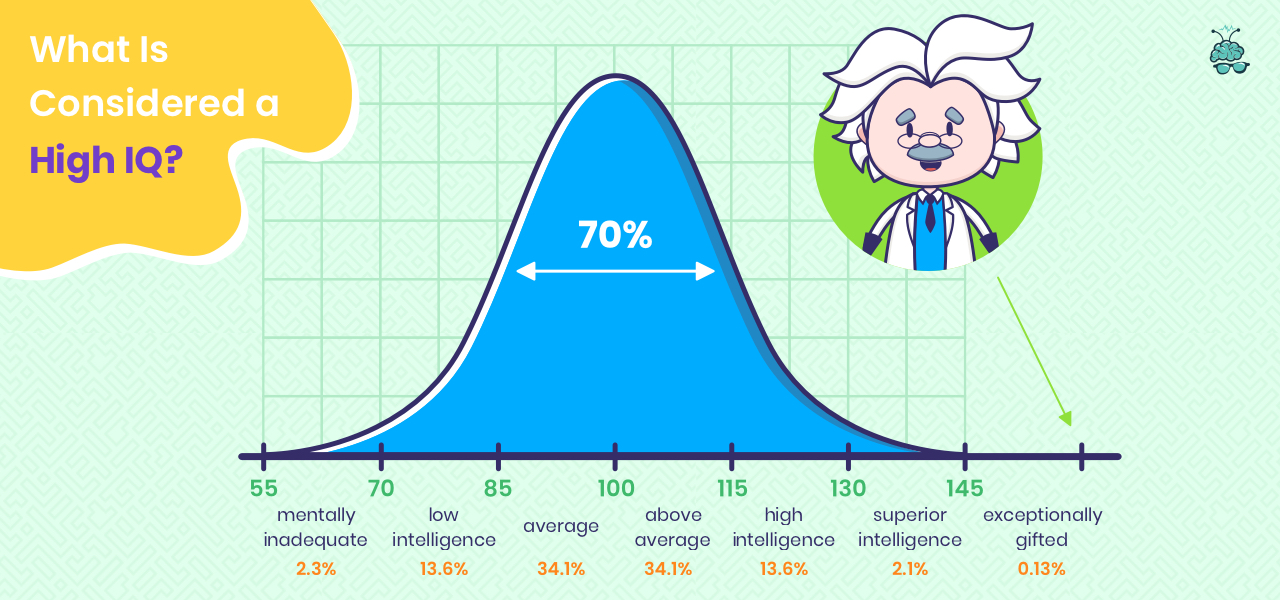In today's competitive world, the concept of intelligence is often measured through a numerical value called IQ, or Intelligence Quotient. A high IQ is frequently associated with exceptional cognitive abilities, problem-solving skills, and academic success. This article will explore what constitutes a high IQ, how it is measured, and its significance in various aspects of life.
High IQ scores have long fascinated psychologists, educators, and the general public alike. Many people wonder what it truly means to have a high IQ and how it can impact one’s life. This article aims to provide an in-depth understanding of the concept of high IQ and the factors that contribute to it, along with the implications of such intelligence in daily life.
Furthermore, we will delve into the controversies surrounding IQ testing, the limitations of IQ scores, and the importance of a holistic approach to assessing intelligence. By the end of this article, readers will have a comprehensive understanding of high IQ and its relevance in today’s society.
Table of Contents
- 1. Definition of IQ
- 2. Measuring IQ: Tests and Scales
- 3. What Constitutes a High IQ?
- 4. Significance of High IQ in Life
- 5. Controversies Surrounding IQ Testing
- 6. Limitations of IQ Scores
- 7. A Holistic View of Intelligence
- 8. Conclusion
1. Definition of IQ
Intelligence Quotient (IQ) is a standardized measure used to assess human intelligence. It is derived from a series of cognitive tests designed to evaluate reasoning, problem-solving abilities, and comprehension. The concept of IQ was first introduced by French psychologist Alfred Binet in the early 20th century, with the intention of identifying students who needed academic assistance.
IQ scores are generally classified into different ranges. The average IQ score is set at 100, with most people scoring between 85 and 115. Scores above this range indicate above-average intelligence, while scores below indicate below-average intelligence. The specific criteria for what constitutes a "high IQ" can vary depending on the testing scale used.
2. Measuring IQ: Tests and Scales
There are several standardized tests used to measure IQ, each with its own methodology and scoring system. Some of the most commonly used IQ tests include:
- Wechsler Adult Intelligence Scale (WAIS)
- Stanford-Binet Intelligence Scale
- Raven's Progressive Matrices
- Cattell Culture Fair Intelligence Test
Each of these tests assesses various aspects of intelligence, including verbal comprehension, perceptual reasoning, working memory, and processing speed. The results are then converted into an IQ score that reflects an individual’s cognitive abilities relative to the general population.
3. What Constitutes a High IQ?
The classification of a high IQ can vary, but generally, an IQ score of 130 or above is considered high, placing individuals in the top 2% of the population. This score is often associated with exceptional intellectual capabilities. Here are some categories based on IQ scores:
- Average IQ: 85-115
- Above Average: 115-130
- High IQ: 130-145
- Very High IQ: 145-160
- Genius Level: 160 and above
Individuals with high IQs often excel in academic settings and may be more likely to pursue advanced degrees or careers in fields that require complex problem-solving skills.
4. Significance of High IQ in Life
A high IQ can significantly impact various aspects of an individual’s life. Research has shown that individuals with higher IQ scores tend to achieve greater academic success, earn higher salaries, and have better job performance. Some key areas where high IQ can have a positive effect include:
- Academic Achievement: High IQ individuals often perform better in school and may pursue higher education.
- Career Opportunities: Many professions, especially in science, technology, engineering, and mathematics (STEM), value high cognitive ability.
- Problem-Solving Skills: A high IQ often correlates with advanced critical thinking and problem-solving skills.
- Social Implications: High IQ individuals may find it easier to navigate complex social situations due to their cognitive abilities.
5. Controversies Surrounding IQ Testing
Despite its widespread use, IQ testing has faced criticism over the years. Some argue that IQ tests may not accurately reflect an individual’s intelligence due to cultural biases, socioeconomic factors, and educational disparities. Additionally, the emphasis on IQ as a singular measure of intelligence has been challenged by various psychologists and educators.
Critics also argue that IQ tests may not account for creativity, emotional intelligence, and other forms of intelligence that are equally important in personal and professional success. This has led to ongoing debates about the validity and fairness of IQ testing.
6. Limitations of IQ Scores
While IQ scores can provide valuable insights into cognitive abilities, there are several limitations to consider:
- Contextual Factors: Environmental influences, such as access to education and socio-economic status, can impact IQ scores.
- Single Measure: IQ tests primarily measure analytical intelligence and may overlook other important cognitive abilities.
- Stability: IQ scores can fluctuate over time due to changes in education, life experiences, and personal growth.
These limitations highlight the importance of not solely relying on IQ scores to assess an individual's potential or capabilities.
7. A Holistic View of Intelligence
Understanding intelligence requires a more holistic approach. Howard Gardner’s Theory of Multiple Intelligences suggests that there are various types of intelligence, including linguistic, logical-mathematical, spatial, musical, bodily-kinesthetic, interpersonal, intrapersonal, and naturalistic intelligence. Recognizing these different forms allows for a broader understanding of human capabilities and success.
Incorporating emotional and social intelligence into the conversation about high IQ can provide a more nuanced perspective on what it means to be intelligent. Individuals may excel in various areas that are not captured by traditional IQ tests, demonstrating that intelligence is multifaceted.
8. Conclusion
In conclusion, a high IQ is often associated with exceptional cognitive abilities and can have significant implications for an individual's academic and professional life. However, it is essential to recognize the limitations of IQ testing and the importance of a holistic view of intelligence. By understanding the complexities of intelligence, we can better appreciate the diverse skills and talents that individuals possess.
We encourage readers to reflect on their own understanding of intelligence and consider the various factors that contribute to success in life. If you have thoughts or experiences related to high IQ, please feel free to leave a comment below or share this article with others who may find it helpful.
Thank you for reading! We hope to see you again soon for more insightful articles.
You Might Also Like
Johnny Galecki: The Journey From Roseanne To StardomExploring The Cinematic Journey Of Orlando Bloom: A Deep Dive Into His Films
Dominic Raiola: A Comprehensive Biography And Career Overview
Reba McEntire 2023: The Queen Of Country Music's Journey Continues
Pisces And Sagittarius: A Cosmic Connection
Article Recommendations
- Hisashi Ouchi Real Body Photos
- Iodine Testicle Painting
- Scheels Black Friday 2024
- Scheels Black Friday Ad
- Age Layla Jenner
- Barron Trump Height Disease
- Who Is Kathleen Turners Partner
- Kimberly Guilfoyle Before And After
- Goth Egg
- Hwang In Yeop Kim So Hyun
/2795585-article-what-is-a-genius-iq-scoreecf71fe1-aadb-424b-b6ce-9a15002d2fdd-5a56782989eacc003758bb57.png)

